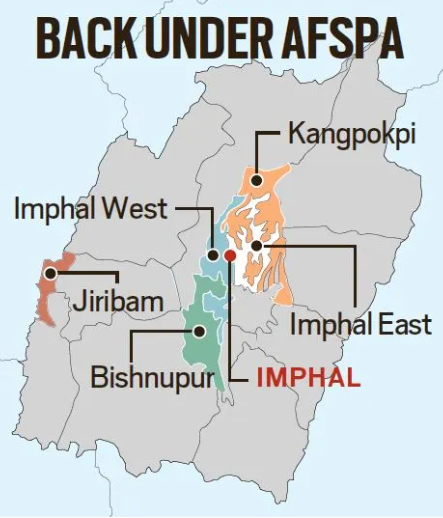AFSPA back in six violence-hit areas of Manipur
(Source – The Hindu, International Edition – Page No. – 1)
| Topic: GS2 – Governance, GS3 – Internal Security |
| Context |
| ● The Union Home Ministry has reimposed the Armed Forces (Special Powers) Act (AFSPA) in six police station limits of Manipur due to ongoing ethnic violence.
● The re-imposition, effective until March 2025, aims to assist security forces in controlling insurgent activities. |
Analysis of the news:

- The Union Home Ministry reimposed AFSPA in Manipur on Thursday due to ethnic violence.
- Six police station limits in five districts have been declared “disturbed areas” for security operations.
- These areas include parts of Imphal West, Imphal East, Jiribam, Bishnupur, and Kangpokpi.
- AFSPA was withdrawn in April 2022 due to improved security, but the situation remains volatile.
- The reimposed AFSPA will be effective until March 31, 2025.
- The Army and Assam Rifles can operate freely without waiting for Magistrates or police.
- Ethnic violence between Meitei and Kuki-Zo people has led to over 240 deaths since May 2023.
- Recent violence since November 7 has killed at least 14 people.
- Central and State governments can issue disturbed area notifications under AFSPA.
| Armed Forces (Special Powers) Act, 1958 (AFSPA) |
| AFSPA Act Overview
● The Armed Forces (Special Powers) Act (AFSPA) is an Indian law that grants special powers to the armed forces in regions declared “disturbed areas.” ● The Act is designed to enable the military to act with more authority and less restriction in areas facing internal disturbances or insurgency. Imposition of AFSPA ● AFSPA is imposed by the state or central government, based on the assessment of the security situation. ● A region is declared a “disturbed area” by the government, typically after an evaluation of violence, insurgency, or unrest. ● The government can impose AFSPA in such areas to allow security forces to operate more freely, even without a Magistrate’s permission. Who Can Impose AFSPA ● The state or central government can declare areas as disturbed and impose AFSPA. ● The power to impose AFSPA lies with the Governor of a state or the central government. Need for AFSPA ● It is seen as essential for maintaining law and order in areas facing insurgencies, militancy, or severe civil unrest. ● AFSPA allows security forces to act swiftly against insurgents and militants. Issues Associated with AFSPA ● The law has been criticised for empowering security forces with excessive powers, leading to human rights abuses. ● Allegations of arbitrary arrests, extrajudicial killings, and torture are often raised against the military and police. ● Calls for its repeal stem from concerns over the violation of civil liberties, particularly in regions like Kashmir and Northeast India. ● Prolonged imposition of AFSPA in regions has sparked debates on its effectiveness and its negative impact on local populations. |
| PYQ: Human rights activists constantly highlight the view that the Armed Forces (Special Powers) Act, 1958 (AFSPA) is a draconian act leading to cases of human rights abuses by the security forces. What sections of AFSPA are opposed by the activists? Critically evaluate the requirement with reference to the view held by the Apex Court. (200 words/12.5m) (UPSC CSE (M) GS-3 2015) |
| Practice Question: Critically evaluate the Armed Forces (Special Powers) Act (AFSPA) in the context of maintaining national security. Discuss its implications on human rights and the challenges associated with its prolonged imposition. (250 Words /15 marks) |
